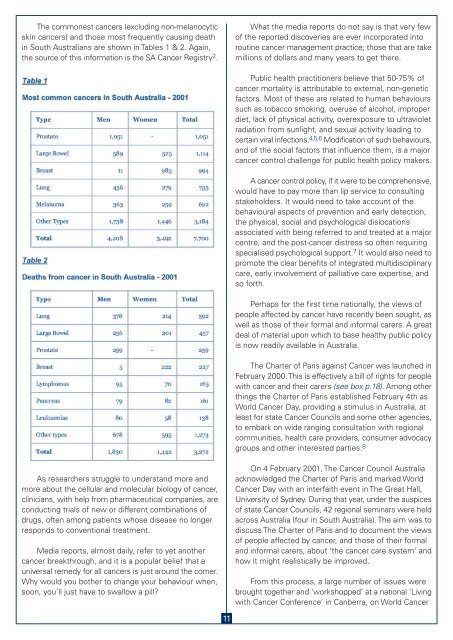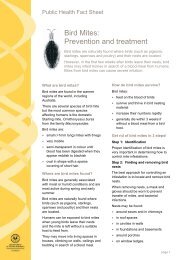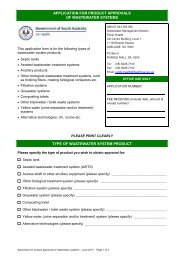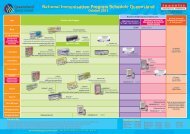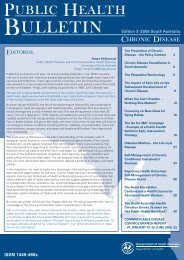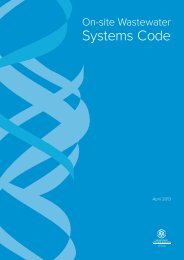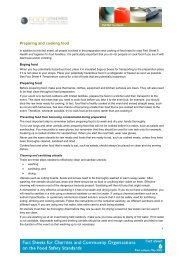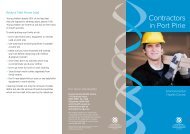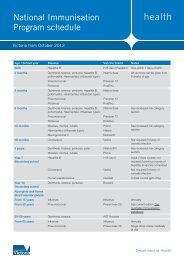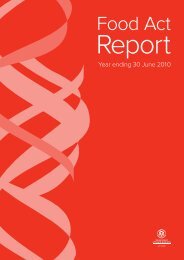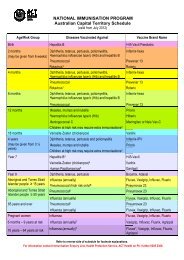Public Health Bulletin Edition 1, 2004 - SA Health - SA.Gov.au
Public Health Bulletin Edition 1, 2004 - SA Health - SA.Gov.au
Public Health Bulletin Edition 1, 2004 - SA Health - SA.Gov.au
Create successful ePaper yourself
Turn your PDF publications into a flip-book with our unique Google optimized e-Paper software.
The commonest cancers (excluding non-melanocytic<br />
skin cancers) and those most frequently c<strong>au</strong>sing death<br />
in South Australians are shown in Tables 1 & 2. Again,<br />
the source of this information is the <strong>SA</strong> Cancer Registry 2 .<br />
What the media reports do not say is that very few<br />
of the reported discoveries are ever incorporated into<br />
routine cancer management practice; those that are take<br />
millions of dollars and many years to get there.<br />
<strong>Public</strong> health practitioners believe that 50-75% of<br />
cancer mortality is attributable to external, non-genetic<br />
factors. Most of these are related to human behaviours<br />
such as tobacco smoking, overuse of alcohol, improper<br />
diet, lack of physical activity, overexposure to ultraviolet<br />
radiation from sunlight, and sexual activity leading to<br />
certain viral infections. 4,5,6 Modification of such behaviours,<br />
and of the social factors that influence them, is a major<br />
cancer control challenge for public health policy makers.<br />
A cancer control policy, if it were to be comprehensive,<br />
would have to pay more than lip service to consulting<br />
stakeholders. It would need to take account of the<br />
behavioural aspects of prevention and early detection,<br />
the physical, social and psychological dislocations<br />
associated with being referred to and treated at a major<br />
centre, and the post-cancer distress so often requiring<br />
specialised psychological support. 7 It would also need to<br />
promote the clear benefits of integrated multidisciplinary<br />
care, early involvement of palliative care expertise, and<br />
so forth.<br />
Perhaps for the first time nationally, the views of<br />
people affected by cancer have recently been sought, as<br />
well as those of their formal and informal carers. A great<br />
deal of material upon which to base healthy public policy<br />
is now readily available in Australia.<br />
The Charter of Paris against Cancer was l<strong>au</strong>nched in<br />
February 2000. This is effectively a bill of rights for people<br />
with cancer and their carers (see box p.18). Among other<br />
things the Charter of Paris established February 4th as<br />
World Cancer Day, providing a stimulus in Australia, at<br />
least for state Cancer Councils and some other agencies,<br />
to embark on wide ranging consultation with regional<br />
communities, health care providers, consumer advocacy<br />
groups and other interested parties. 8<br />
As researchers struggle to understand more and<br />
more about the cellular and molecular biology of cancer,<br />
clinicians, with help from pharmaceutical companies, are<br />
conducting trials of new or different combinations of<br />
drugs, often among patients whose disease no longer<br />
responds to conventional treatment.<br />
Media reports, almost daily, refer to yet another<br />
cancer breakthrough, and it is a popular belief that a<br />
universal remedy for all cancers is just around the corner.<br />
Why would you bother to change your behaviour when,<br />
soon, you’ll just have to swallow a pill<br />
On 4 February 2001, The Cancer Council Australia<br />
acknowledged the Charter of Paris and marked World<br />
Cancer Day with an interfaith event in The Great Hall,<br />
University of Sydney. During that year, under the <strong>au</strong>spices<br />
of state Cancer Councils, 42 regional seminars were held<br />
across Australia (four in South Australia). The aim was to<br />
discuss The Charter of Paris and to document the views<br />
of people affected by cancer, and those of their formal<br />
and informal carers, about ‘the cancer care system’ and<br />
how it might realistically be improved.<br />
From this process, a large number of issues were<br />
brought together and ‘workshopped’ at a national ‘Living<br />
with Cancer Conference’ in Canberra, on World Cancer<br />
11


